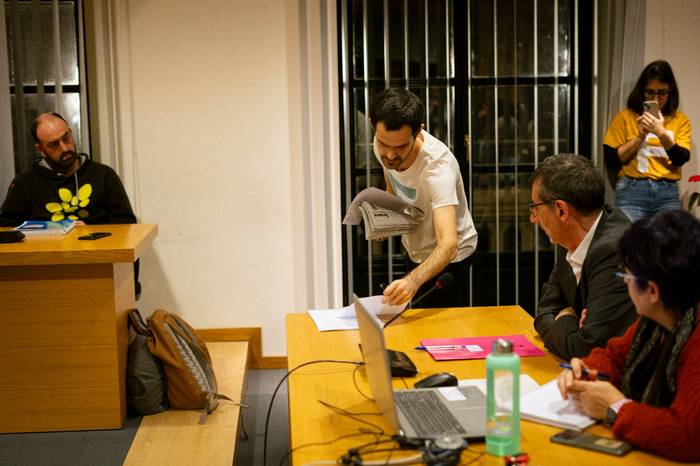"Brazil has to look more at Latin America"
- On the occasion of the integration of Latin America, we met in Buenos Aires with economist and researcher Ricardo Aronskind. He is a university professor in this city and the Argentine Government has called him as an advisor to make decisions about the integration of Latin America.

Several Latin American heads of state speak of the need for regional integration. They consider it essential for the maintenance of development in the future. Why is it so urgent?
It's something that comes from far away. In the 1950s, ECLAC, which was a giant center of Latin American thought, said it was not enough to implement policies to support industry in each Latin American country. Instead, states had to build a large market so that Latin American companies could reach continental size and compete with other international companies.
Following this path, ALAC (Latin American Free Trade Association) and ALADI (Latin American Integration Association) emerged. These are two attempts to create conditions conducive to a common market, but the results have been very limited. Subsequently, MERCOSUR (Common Market of the South) arrived in the 1990s and is creating integration entities very slowly.
What are the reasons you see in the international context for speeding up the integration of Latin America?
China’s strong boom is one of the factors, the dynamic evolution of South-East Asia is another, and above all, the explosion of the 2008 crisis has increased competition between countries. Just as the crisis is being managed, international demand is not growing and this increases tensions in accessing the demands of other countries. Competition for new markets has increased and Latin America is still engaged in a debate on minor issues, at a time when integration should be an indispensable condition for survival. We must move towards deeper economic convergence, leaving aside the various sectoral interests that exist and that lobby against integration.
Are they internal or external pressures?
Internal. Brazilians, Argentinians… Let me give you an example. The Senate of Paraguay is impeding Venezuela ' s membership of MERCOSUR. Venezuela asked to join MERCOSUR, it would be a very important contribution to boosting unity and integration and only for ideological interests, for a certain vehement antichavism, is not being allowed into MERCOSUR.
What could Venezuela do if it entered MERCOSUR?
We have to think beyond Venezuela Chávez. In my opinion, he maintains a special mystique in Latin American integration, within the historical perspective that the rest of the countries lack. However, whether or not there is Chávez, Venezuela is a large oil country that can guarantee reserves for the entire region. Venezuela and Argentina are in return. Argentina helps the industrialization of Venezuela and Venezuela provides us with energy resources. In the region there are also many possibilities for concrete exchange. It would add population to the partnership and give us more international weight.
You mentioned the ideological element as an obstacle. Among the Latin American countries, there are governments with radically different political roots in power. Does this create major obstacles when it comes to understanding economic integration?
Yes, absolutely. It seems to me that there is a deep trench between those who bet on the Latin American market, on the one hand, and those who direct everything to the international market, on the other. The example of Chile is clear. It is highly praised by the international press. Because it's the model of underdeveloped country. It sells copper, it sells wood, it sells fruit, it sells fish -- and that's great. That is what the world is asking of Latin America.
To what extent have the decisions taken so far been developing the integration of the Latin American countries?
In the economic field, integration is still rather superficial. In fact, there are many exceptions that violate the general rules. On the other hand, we have not yet moved from a purely commercial scenario to a more planned approach, where we will have to consciously decide which industrial branch each state is going to develop and what it is going to specialise within the bloc.
We are also well behind in the political arena. We need institutions that do not depend on the intervention of the Heads of Government or the Finance Ministers. A court made up of internal affairs experts should be the one that manages and has the necessary authority. It is a very sensitive issue and the main problem is the attitude of Brazil. Brazil looks very important and, in part, it looks like this. But I do not think it has to be seen with such weight, I think there is a mistaken opinion from the international community towards Brazil.
Brazil is an underdeveloped country. It has some very interesting options, but it's an underdeveloped country, like Mexico. Brazil has gigantic, geographic and productive social inequalities… Brazilian economists called their country Belindia. Mixture of Belgium and India. That was before Lula’s mandates, but it continues to maintain the hallmarks of a country that has been subjected to it.
According to some analysts, behind the integration process is the desire for hegemony in Brazil. Its intention is to turn the region into its jumping platform to present it as an international power.
There's some truth to that assumption. Above all, for the rest of the region to grow. Brazil is interested in Argentina as Argentina grows and vice versa. If Argentina is financially upside down, it will not interest you.
I believe that Brazil needs to look much more at Latin America. The world market will not be easy in the coming years. It will not be easy to enter the US market, let alone that of the European Union. We have to look at Latin America and Brazil as well. Not as a support for the international projection, but as an objective. All markets are reducing their demand, I don't know why they should buy us. We have to strengthen a market of 550 million people.
In recent years, Latin American states have recorded positive macroeconomic data and have managed to maintain growth. However, these data have not been reflected, at least proportionately, in the improvement of the living conditions of the majority of the population. Will regional integration improve social integration?
If each state significantly reduced its poverty, we would have a better scenario for integration. Latin America has a market reserve of 200 million inhabitants, excluding those currently out of the market. They have not been interned in the Latin American economy and that is a disgrace.
Latin America is a truly unfair continent. The most unfair in the world. All wealth is collected by a minority of society, and that wealth is sent out of the region. It also happens in Venezuela, Mexico, Argentina, Brazil and Chile.Los data on the amount of wealth sent to the Caribbean, Switzerland or other tax havens are spectacular.
In the financial sphere, much has been said about the need to create supranational entities.
Very interesting ideas have been heard in recent weeks. For example, the elimination of the dollar as a transaction currency within Latin America. Something similar happens with trade operations between Argentina and Brazil. The measure can be extended to the region. It is very important to seek a greater degree of monetary sovereignty. The creation of the South Bank is also very important. There has also been talk of the need to fund the crisis. This would be an aid fund for countries which are unbalanced by speculative capital.
In addition, it would be very good if countries that have their foreign reserves were to repay it. It's crazy. Let us bring it to Latin America and use it productively!
The coup d ' état in Honduras or the attempted coup of Ecuador have called into question the sovereignty of the countries of the region. These events have received a joint response from the Latin American states. Is it a step forward in political integration?
I would add another fact. Attempted independence of the Santa Cruz region of Bolivia. It was also repealed by UNASUR (Union of South American Nations).
In fact, this joint position was a great surprise. Because it's not common in Latin America. Brazil and Argentina, for example, have been behind the blows that have taken place in Bolivia. However, today we see that relations are used to support democratic processes. Without democracy, we know that dictators, with the help of technocrats and concentrated economic groups, can govern U.S. orders.
To what extent is the dream of seeing United Latin America extended?
I don't think it's too widespread. I don't mean that it's not potentially extended, but Bolivar's dream demands recovering the history of Latin America, re-reading, understanding, knowing the rest of Latin America, and that's still very weak in many ways. Let us say clearly: globalization and neoliberalism are anti-history.
Now there's a revitalization of history. Neither what Chávez has done in his country, nor what he has done. He goes back and forth to Bolivar's thought. However, we still see many absurd nationalisms in Latin America, which create an anti-integration attitude in people. Then that attitude becomes a colonized relationship that depends on the Europeans or the Americans. Much remains to be done, to restore that spirit, to give the necessary soul to Latin American integration. If integration should be just trade and business, it won't be.
Vagina Shadow(iko)
Group: The Mud Flowers.
The actors: Araitz Katarain, Janire Arrizabalaga and Izaro Bilbao.
Directed by: by Iraitz Lizarraga.
When: February 2nd.
In which: In the Usurbil Fire Room.

























